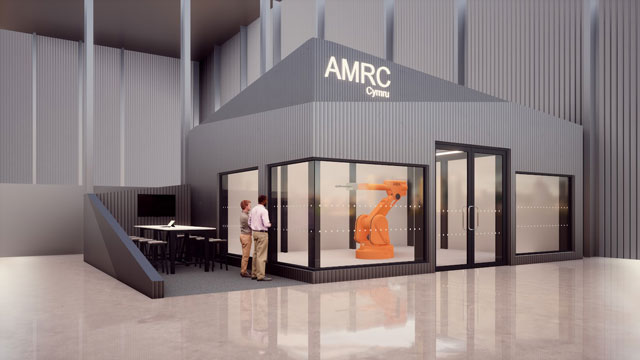
The University of Sheffield Advanced Manufacturing Research Centre (AMRC) is helping the UK along the road to net zero by de-risking the assembly and production scale up of hydrogen fuel cells for the aerospace, automotive and rail industries.
Construction of a new £600,000 Hydrogen Electric Propulsion Systems (HEPS) testbed, based at AMRC Cymru in North Wales, will begin shortly, with completion planned for January 2022. The testbed is designed to drive the industrialisation of hydrogen technology, harnessing AMRC’s expertise in design to manufacture a fuel cell assembly testbed where Industry 4.0 technologies and in-process inspection techniques will optimise the assembly process.
“Hydrogen fuel cells can address key challenges of the transport sector as it searches for alternatives to the internal combustion engine,” said Lee Wheeler, Hydrogen Technology Lead at AMRC Cymru. “However, the current cost of manufacturing and assembling the fuel cells is incredibly high, which means there’s a lack of uptake.
“We want to support businesses who want to make the net zero energy transition to hydrogen electric propulsion systems by giving them a facility where they can use advanced manufacturing techniques to assemble and verify their product and then eventually integrate it in their vehicles.”
Like battery electric vehicles (BEV), fuel cell electric vehicles (FCEV) run on a supply of electricity. However, whereas BEVs take hours to recharge to maintain that supply, FCEVs burn hydrogen which can be refuelled in minutes. The bi-product of the chemical reaction is water vapour which means that, in operation, fuel cells are a zero-carbon propulsion system that can produce electricity for as long as fuel is supplied.
The High Value Manufacturing (HVM) Catapult, of which the AMRC is one of seven centres across the UK, has funded the project which is specifically targeting seven industries: aerospace, energy generation, heavy automotive, off highway, public transport and rail.
Work on the HEPS testbed is being guided by an industry steering board which includes large global manufacturers including BAE Systems, GKN, Rolls-Royce and Toyota, alongside smaller companies such as electric vehicle manufacturers Wave Industries, Hypermotive and Riversimple. The board has been assembled by the AMRC to ensure that work is industry relevant and addresses real-world manufacturing challenges relating to this technology.

